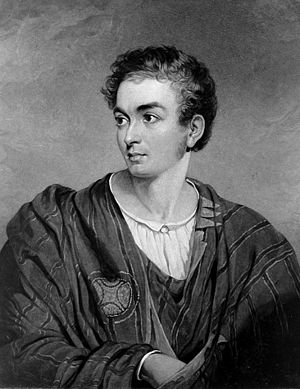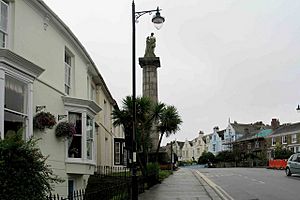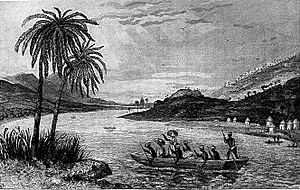Richard Lander facts for kids
Quick facts for kids
Richard Lander
|
|
|---|---|

Richard Lemon Lander in 1835
|
|
| Born |
Richard Lemon Lander
8 February 1804 Truro, Cornwall, England
|
| Died | 6 February 1834 (aged 29) |
| Cause of death | Injuries from a musket ball wound |
| Occupation | Explorer |
Richard Lemon Lander (born February 8, 1804 – died February 6, 1834) was a brave British explorer. He traveled a lot in western Africa. He and his brother John made a very important discovery. They were the first Europeans to follow the entire River Niger. They found out that this big river flowed all the way to the Atlantic Ocean.
Contents
Richard Lander's Life and Adventures
Early Life and First Journeys
Richard Lander was born in Truro, England. His father was an innkeeper. Richard went to school until he was 13 years old. After that, he started traveling.
In 1817, he went with a merchant to the West Indies. He got sick with yellow fever there. After returning home in 1818, he worked for rich families in London. This job allowed him to travel around Europe.
Exploring with Hugh Clapperton
Richard's journey as an explorer began in 1823. He worked for a Scottish explorer named Hugh Clapperton. They first went to the Cape Colony in Africa. Then, in 1825, they started an expedition to Western Africa.
Sadly, Clapperton died in 1827 in what is now Nigeria. Richard Lander was the only European left from the group. He continued his journey alone. He traveled southeast to Kano. From there, he went south to Funda on the Benue River. He became the first European to visit the town of Zangon Katab. He wrote notes about the Atyap who lived there. After this, he traveled through the Yoruba region back to the coast. He returned to Britain in July 1828.
Discovering the Niger's Course
The British Government asked Lander to return to West Africa in 1830. This time, his brother John came with him. They landed at Badagri on March 22, 1830. Their main goal was to follow the lower River Niger. They wanted to see where it ended.
They started at Bussa and followed the river to the sea. They explored about 160 kilometers of the River Niger upstream. Then, they used a canoe to explore the River Benue and the Niger Delta. In the delta, local people at Aboh captured them. The local king, Obi Ossai, demanded a large payment for their release.
Kingboy Amain, a leader from the Nembe Brass Kingdom, helped them. His kingdom was involved in important trade. He paid the ransom to free the Lander brothers. He took them to Nembe, where they arrived on November 15, 1830.
Richard then went to Akassa to try and get the ransom money back from an English captain. John stayed in Nembe for a few days. Later, John joined Richard, and they sailed back to Britain. Even though the ransom was not paid back, Kingboy Amain made sure they were safe.
Despite this challenge, they succeeded in their mission. They found out exactly where the great River Niger ended. They returned to Britain in 1831, traveling from Fernando Po via Rio de Janeiro.
Final Expedition and Death
In 1832, Lander went back to Africa for his third and last trip. He led an expedition for merchants from Liverpudlian. They wanted to set up a trading post where the Niger and Benue rivers met. They used two steamships called the Quorra and the Alburkah.
However, the expedition faced many problems. Many people on the trip died from fever. They could not reach Bussa. While traveling upstream in a canoe, local people attacked Lander. He was shot in his leg. He managed to get back to the coast. But the bullet was too deep to remove. He became very sick from the wound and sadly passed away.
Richard Lander was buried in the Clarence cemetery in Fernando Po. He left behind his wife and daughter. The musket ball that wounded him is said to be in a museum in Woolwich, England.
Richard Lander's Legacy
In his hometown of Truro, there is a monument called Lander's Monument. It was built in 1835. The Richard Lander School is also named after him. A housing area called Trelander, which means "home of Lander" in Cornish, also honors him.
In 1832, Richard Lander received the first Royal Geographical Society Founder's Medal. He earned it for his "important services in determining the course and termination of the Niger."
To celebrate 200 years since Richard Lander's birth, an "Expedition of Goodwill" was sent in November 2004. This group retraced the Lander brothers' famous river journey.
See also
 In Spanish: Richard Lemon Lander para niños
In Spanish: Richard Lemon Lander para niños
- List of explorers
- Explorations (disambiguation)



